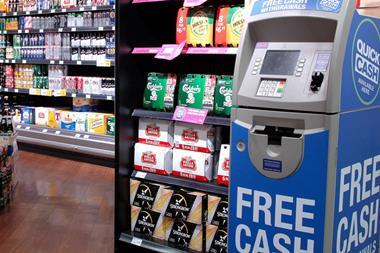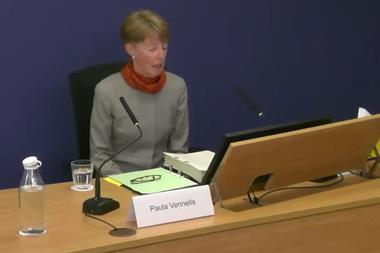Plans to cut interchange rates by 20% will not result in an immediate significant decline in free-to-use cash machine numbers, Sir Mark Boleat, chairman of the Link cash machine network, has vowed.
Responding to a recent letter from Chair of the Treasury Committee Nicky Morgan MP, Boleat said that the immediate number of cash machine closures, as a result of the plans, would “be negligible”.
“Given the central role cash continues to play in the lives of people in the UK, we are resolutely committed to protecting cash-access,” he said.
“This means not only maintaining our nationwide network of free-to-use ATMs, but to expand its reach to serve those communities which are currently underserved.
“The proposals are designed to maintain the present geographical spread of ATMs, with any reduction being in areas where there are currently multiple ATMs located close together. Around 80% of free-to-use ATMs are currently within 300 metres of another free-to-use machine.
“As the current rate has led to around 5,000 new free-to-use machines over the last three years we believe that the initial impact will be to stop this unnecessary growth.”
Under the Financial Inclusion Programme Link also planned to triple the maximum subsidy for ATMs in rural areas and less affluent communities – a move which would not only protect but expand the spread of ATMs across the UK, he added.
ATM numbers would be closely monitored on a monthly basis and any closures would likely to be concentrated in urban, more affluent areas with a high saturation of machines, he added.
Link is proposing that the cut interchange rate should occur gradually, over a four year period, giving ATM operators “sufficient time to address any contractual arrangements which may be in place.”
However, despite Link’s assurances, Morgan said that it was still “difficult to see” how Link’s guarantee to maintain the reach of the current network of free-to-use ATMs could be met.
“They are taking a ‘leap in the dark’ with these proposals,” Morgan responded. “The Committee, therefore, will examine developments to ensure that there are no negative impacts on financial inclusion.
“It’s important to understand whether the proposals are a reasonable step to protect the sustainability of the ATM network, or whether it’s a profit-boosting drive by the big banks at the expense of consumers,” she added.
Commenting on the correspondence, the Association of Convenience Stores said it was “strongly in favour” of retaining the existing network of cash machines.
Chief executive James Lowman said: “There are many local traders, market stalls and other small businesses in towns and villages across the UK that can only accept cash, and these businesses often rely on nearby ATMs to ensure that people can shop with them.
“Convenience stores have invested in the provision of free cash machines as part of their commitment to serve thousands of communities, but this is under threat by Link’s proposals which could make many unviable.”
“Any proposals that would result in a reduction in the number of cash machines must be scrutinised in detail, and we welcome Nicky Morgan’s comments on the issue.
“Cash remains an essential part of a convenience store business, so any reduction in the number of locally available ATMs could have a significant negative impact, both on convenience stores and other local businesses.”
Link’s consultation into the plans closed on 30 November. The Board is expected to publish its final decision by 31 January and implement its plans by 1 April 2018.






















No comments yet